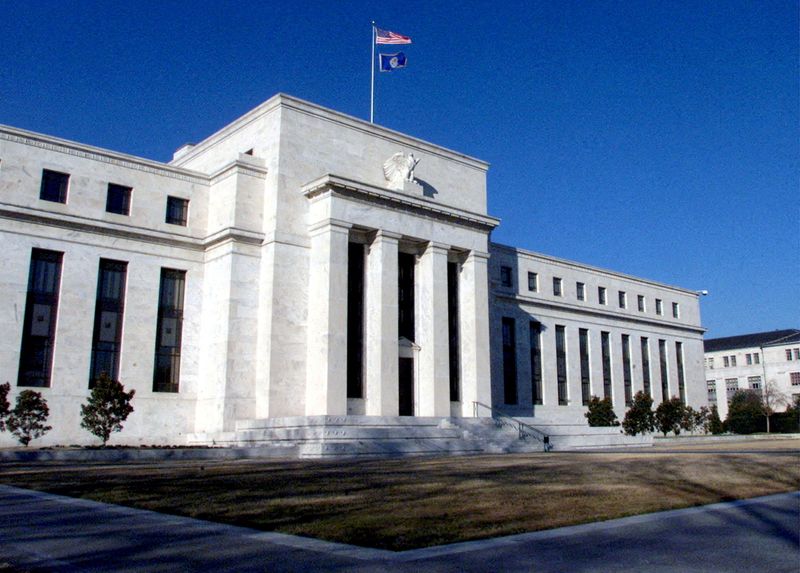A look at the day ahead in U.S. and global markets by Mike Dolan
The Federal Reserve has been so successful in preventing markets from running away with the prospect of peak interest rates, it may have overdone it and be minded to row back a bit.
Such is the jolt to bonds and stocks since the Fed dangled one last rate hike over markets last week, the sharp tightening of financial conditions since may have done much of the work for it already.
Goldman Sachs' index of U.S. financial conditions has jumped half a percent over the past week since the hawkish Fed readout and now clocks its tightest level of the year.
Fed chair Jerome Powell's latest comments at a Washington event on Thursday could now be an important marker of whether the central bank boss feels any need to nuance the message that his colleagues rammed home this week. Minneapolis Fed chief Neel Kashkari said again on Tuesday there's 40% chance rates would need to rise "meaningfully" to beat inflation.
There was some respite on Wednesday from the week's unnverving shakeout, however, and some pointed to last ditch attempts in Congress to avert a U.S. government shutdown at the weekend as steadying the ship.
But the past 24 hours were another bruising affair that raise questions about investor positioning going into the final quarter of 2023 next week and ahead of the upcoming corporate earnings season. China's markets will also be disrupted by Golden Week holidays next week.
Ten-year Treasury yields hit another 16-year high at 4.56% on Tuesday before dialling back a bit on Wednesday, with 10-year real yields hitting 14-year peaks at 2.24%.
Shorter dated notes were better behaved, however, and two-year yields dropped 10 basis points overnight to 5.05% following a decent auction uptake on Tuesday. The upshot was a further disinversion of the 2-10-year yield curve to its least negative in four months.
Selling of stocks abated somewhat too, with MSCI's all-country index just clinging to positive territory on Wednesday after its longest losing streak in over a year and S&P500 futures rebounding about 0.5% before the bell.
But this week's recoil has been bruising. The S&P500 and the Nasdaq hit their lowest since June on Tuesday, with the former on course for its worth month of the year with September losses of more than 5%.
And volatility gauges are stirring again too. The VIX hit highest since May just below 20 on Tuesday, before easing back today.
Risk spreads in junk bond and overseas sovereign bond markets are also creeping higher again, with exchange-traded U.S. junk bond funds hitting their lowest since May and Italy's governmentbond yield premium over Germany widening too.
Worrying for many investors this week has been how bond yields have climbed despite weaker economic signals and how stock and bond losses are correlating again.
U.S. consumer confidence dropped to a four-month low in September, a second straight monthly decline, and new home sales fell almost 9% in August.
Also worrying for many is how climbing long-term borrowing costs are hitting the concentrated market leadership of mega-cap tech and digital stocks so sensitive to interest rates.
Adding to jitters about the Big Tech retreat, Amazon.com (NASDAQ:AMZN) stock fell 4% on Tuesday as the U.S. Federal Trade Commission filed a long-awaited antitrust lawsuit that charges the online retailer with harming consumers with higher prices.
In more traditional retail, Costco (NASDAQ:COST) topped market estimates for quarterly revenue and profit in results released after the bell on Tuesday but its stock was down 2% ahead of Wednesday's open.
World markets were more mixed, with China's bourses managing some gains ahead of the big holiday week.
Profits at China's industrial companies fell 11.7% year-on-year for the first eight months, narrowing from a 15.5% contraction for the first seven months and potentially suggesting a modest recovery is taking root.
But the rest of the picture there was murky.
The chairman of China Evergrande (HK:3333) Group has been reportedly placed under police surveillance, ratcheting up pressure on the embattled developer during a deepening property market bust.
The United States also restricted goods from three more Chinese companies from entering the United States on Tuesday as part of an effort to eliminate goods made with the forced labor.
Key developments that should provide more direction to U.S. markets later on Tuesday:
* US Aug durable goods orders
* Federal Reserve Board Governor Michelle Bowman gives pre-recorded remarks to Washington conference

* U.S. Treasury auctions 5-year notes, 2-year floating rate notes
* U.S. corporate earnings: Micron (NASDAQ:MU), Paychex (NASDAQ:PAYX)